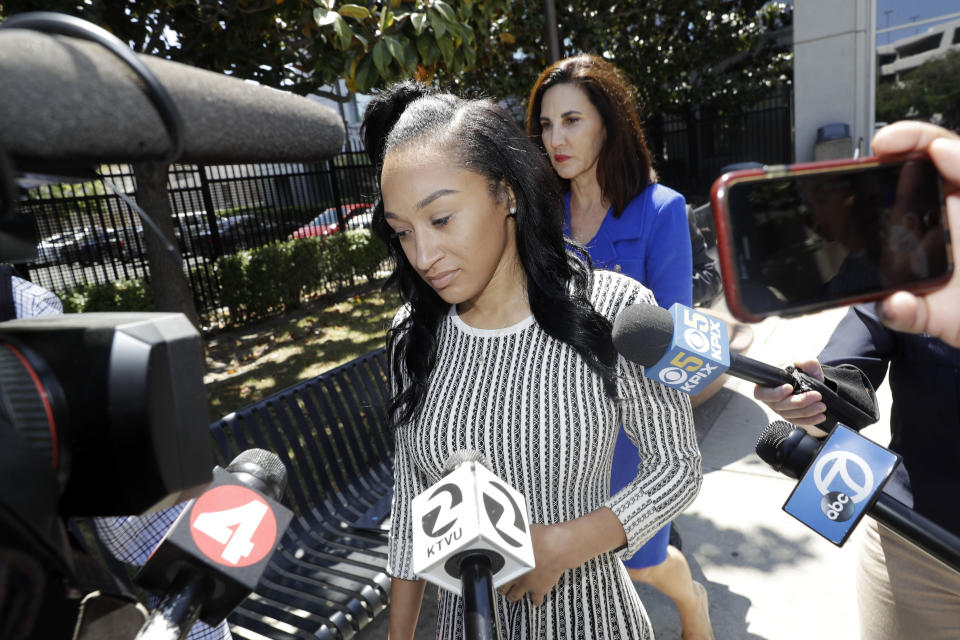Lies told in 49er Reuben Foster's case have done tremendous damage
It’s a troubling echo of the Duke lacrosse case.
San Francisco 49ers linebacker Reuben Foster was arrested in February and charged with domestic violence after his former girlfriend, Elissa Ennis, told police he dragged her by the hair, physically removed her from their house, and punched her in her head at least eight times. Among her injuries, Ennis said she suffered a ruptured eardrum.
Then, last week at a shocking courtroom hearing, Ennis recanted her entire account, saying Foster never hit her and she concocted her story for money.
“It was all about the money,” she said, and that Ennis “wanted to end him.” She said her ruptured eardrum came not from Foster, but from a previous altercation with a woman.

Ennis even testified under cross-examination that in 2011 she did something similar, trying to get an ex-boyfriend arrested for domestic violence. She said she was jailed for the false accusation.
The turn-of-events is fuel for those who argue that the media is too quick to assail an athlete for domestic or sexual abuse before all the facts have come in. In that sense it is reminiscent of the infamous Duke case from 2006, where members of that team were accused of sexually assaulting a stripper, assumed guilty in the court of public opinion, and then found to be completely innocent.
In this case, 49ers executives were also harshly criticized (including by this writer) for a bland and non-committal statement in response to what sounded like a horrible attack. It is possible the team knew more than it was admitting, and it is possible it was being patient. In either case, the 49ers now appear vindicated.
Judge Nona Klippen may still proceed with the case – she will decide on Wednesday – but the damage has been done. It’s been done to Foster’s reputation. It’s been done to future victims who are telling the truth. It’s been done to the many lawyers and social workers who are left with an even more difficult job now. And it’s been done to the pursuit of a better understanding of domestic violence overall.
Fame and fortune almost never comes to those who accuse high-profile athletes of a crime. What often comes to them is venom, pressure, anxiety and sometimes more abuse. To a victim it can seem there are enemies everywhere: on social media, in the police force, in the courtroom, among relatives, and, worst of all, in the home where she lives. There’s a reason domestic violence reporting websites like thehotline.org have two methods on every screen to quickly redirect to Google.com.
Ennis is, tragically, another hindrance to the crucial process of supporting real victims.
Nicole Ford has been a domestic violence attorney in the San Francisco area for more than 14 years. Victims come to her in pursuit of relief and justice, and then as the weeks and months pass, they feel tremendous guilt over the fallout of their actions. They worry about their futures, their children, their families and yes, their abusers. “This isn’t what I wanted to happen,” she so often hears. “I just wanted it to stop.”
The Ennis fiasco does nothing to help make it stop. It may create more tension and distrust in a difficult relationship. “You’ve undermined every victim who has come forward,” Ford says.

Blame for the media is warranted in episodes like this. This case will surely be fodder for the rising tide of media distrust in America. But the role of the media is no less important now. In a high-profile case, the team and the athlete usually have strong voices and well-compensated representation. The team and the athlete have thousands if not millions of fans who don’t want the accusations to be true. The accusers have little or none of that backing. It doesn’t mean facts should be ignored, conclusions should be reached immediately, or minds should be closed to new information. It means a lot of powerful people want actual domestic violence to be swept under the rug, and the media can bring needed sunlight.
There is yet another negative effect from this situation, and that is on the rehabilitation of the justly-accused athlete. If an actual perpetrator of domestic abuse is less willing to see flaws in himself, choosing instead to question the motives of his accuser, that may lead to more problems in his career and life. Domestic violence is rarely a one-episode problem, so rehabilitation requires serious work. The Ray Rice incident in 2014, as ugly as it was for the NFL, has led to what seems like a deeper awareness within Rice himself. In his public interviews, he has been accountable, remorseful, and deferent to his wife. If he didn’t have to face his own behavior, his entire family may have suffered even more.
It now seems likely that Reuben Foster’s career will go on uninterrupted. We can only hope there are no more lies from his ex-girlfriend and there is no more controversy for Foster. (He is still facing a charge of possessing an assault rifle.) We should also hope that everyone from prosecutors to judges to columnists to cops recommit to vigilance. Domestic violence is still a scourge on our society, and it still goes on in the dark corners of quiet neighborhoods all across our country. Ennis is the exception; the rule is far more difficult to fathom. For the benefit of men, women, and children, we can’t afford to get it wrong.
More from Yahoo Sports:
• Did LeBron really snub a Trump supporter at Game 3?
• Player protests the hot-button issue at NFL owners meetings
• Yankee player joins Mickey Mantle in exclusive homer club
• Georgetown LB who took paralyzing hit walks across grad stage
